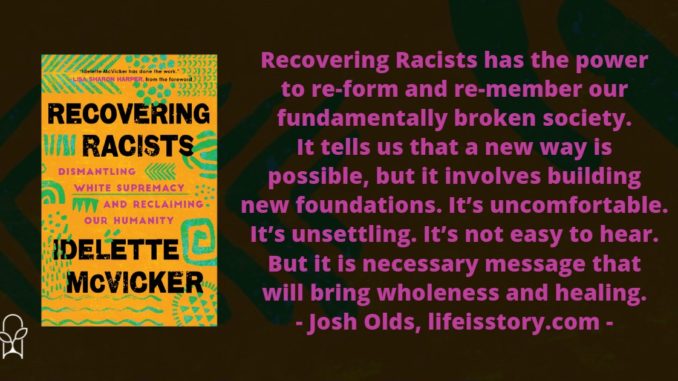
Published by Brazos Press on April 22, 2022
Genres: Non-Fiction, Racial Reconciliation
Buy on Amazon
Goodreads

"It is a rare thing for me to stand with a book, explicitly about race and equity, that is written by a white person. Why? Because it is a rare thing to encounter a white person who has followed the lead of people of color into their own transformation so deeply that I trust the message coming from their white body. Idelette McVicker has done the work."--Lisa Sharon Harper (from the foreword)
As a white Afrikaner woman growing up in South Africa during apartheid, Idelette McVicker was steeped in a community and a church that reinforced racism and shielded her from seeing her neighbors' oppression. But a series of circumstances led her to begin questioning everything she thought was true about her identity, her country, and her faith.
Recovering Racists shares McVicker's journey over thirty years and across three continents to shatter the lies of white supremacy embedded deep within her soul. She helps us realize that grappling with the legacy of white supremacy and recovering from racism is lifelong work that requires both inner transformation and societal change. It is for those of us who have hit rock bottom in the human story of race, says McVicker. We must acknowledge our internalized racism, repent of our complicity, and learn new ways of being human.
This book invites us on the long, slow journey of healing the past, making things right, changing old stories, and becoming human together. As we work for the liberation of everyone, we also find liberation for ourselves. Each chapter ends with discussion questions.
Recovering Racists positions every person who is called White as a beneficiary of racism. And already the arguments begin—“Racism exists, but I’m not racist.” “It’s racist to say that all white people are racist.” “I don’t have a racist bone in my body.” “I don’t care if you’re purple…” “I grew up poor.” But if you’re quiet for a second and learn what it means to be White, then maybe you’ll begin to understand. To author Idelette McVicker, whiteness a “diseased social construct” (quoting Osheta Moore’s Dear White Peacemakers) that doesn’t describe European descent but a declaration of supremacy. Whiteness was created to contrast against Blackness—those in power against those subjugated. And if poor whites held no power, they could at least be thankful they weren’t Black.
One of the most interesting parts of Recovering Racists is that McVicker’s perspective is centered in South Africa and not the United States. Obviously, the book speaks to racism everywhere and does talk about some issues specific to America, but the personal focus is on McVicker’s journey out of Afrikaner nationalism. Books on American-centric racism tend to cover the same history, the same figures, the same events. Which is fine, because these stories need to be told, but McVicker’s account places the same racist ideology into a different context, a different culture, and from a different background. Like David responding to Nathan’s parable about his rape of Bathsheba, we often recognize sin in others but not ourselves. Seeing racism in an unfamiliar history, free of the biases ingrained in American culture, we may just find ourselves calling out for justice only to have McVicker turn the finger toward us and say “Thou art the man.”
The book is divided into five parts: Wake Up, Leave, Repent, Recalibrate, and Repair. The majority of the book is focus on leaving and repairing—the former being the catalyst to change and the latter being that change in action. It all begins though, with waking up to the fact that white people have been biased by, influenced by, immersed in, and the beneficiary of racism. Idwlette humbly and authentically walks readers through her own journey of admitting complicity with a system she no longer wanted to be a part of.
Every chapter of Recovering Racists a series of questions for reflection. It’s more than a memoir or a philosophical discussion. McVicker is serious about practical application and deep thoughtful reflection. In seeking to move forward, McVicker is serious about white people owning up to the historic and systemic injustice inflicted by people who called themselves white in order to exert power over others. McVicker is going to challenge assumptions and pick at some wounds. Recovering Racists is deeply uncomfortable and unsettling, but it shows the pathway to healing.
McVicker concludes the book with a confessional statement for recovering racists, a beautifully powerful statement of acknowledgment, repentance, and commitments. There are so many people who are ready to take the step toward antiracism but just don’t know where to go. Recovering Racists shows the path forward. And it’s not what you might think. It’s not protests or legislative changes (though those are needed), but it begins with the individual and a commitment to change personally. If you get enough people to change personally, then you’ve changed a society.
Recovering Racists has the power to re-form and re-member our fundamentally broken society. It tells us that a new way is possible, but it involves building new foundations. It’s uncomfortable. It’s unsettling. It’s not easy to hear. But it is necessary message that will bring wholeness and healing.
